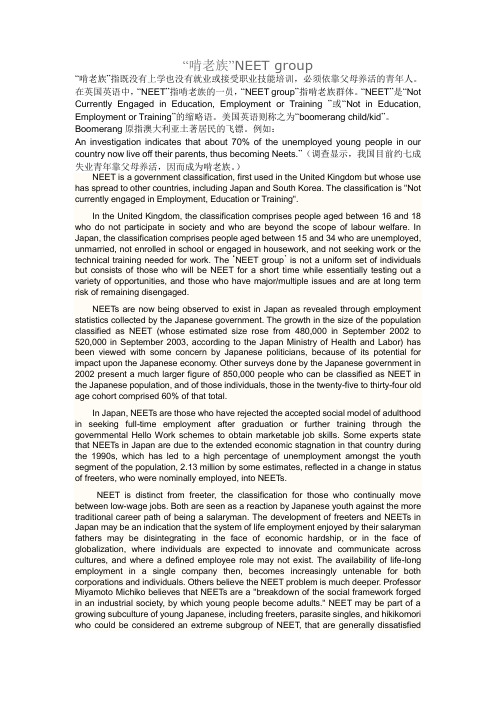啃老族的PPT
- 格式:ppt
- 大小:3.63 MB
- 文档页数:9


当今社会“啃老族”现象解析传统上人们以经济独立作为长大成人的标志。
但如今,中国出现了“啃老族”,即那些已成年,有谋生能力,但主动或是被动放弃了谋生意欲,依旧躺在父母怀里,在不“断乳”的状态下生存的年轻人。
他们生活的主要来源是父母,“长大不成人”是这些“成年孩子”及社会面临的共同尴尬。
一边是劳心劳力、白发苍苍的父母,一边是依赖在父母怀里不“断乳”的子女,与赡养老人相对应,人们将这种现象形象地称为“啃老”。
“啃老族”的出现,已经成为全国性不容忽视的社会问题。
有一则调查报告总结“啃老族”6类常见人群:第一类是高校毕业生,对就业过于挑剔;第二类以工作太累、太紧张为由自动离岗离职;第三类属于“创业幻想型”,虽有强烈的创业愿望,但没有目标,又不愿当个打工者;第四类是频频跳槽者;第五类用过去轻松的工作与如今的紧张繁忙相对比,越比越不如意,干脆不就业;最后一类人文化低、技能差,只能在中低端劳动力市场上工作,但因怕苦怕累索性躲在家中。
“啃老族”的形成有很多方面的原因,比如就业压力大、父母的溺爱等。
但纵观所有“啃老族”的,他们“啃老”的根本原因其实只有一个,就是没有树立正确的世界观与人生观。
世界观的形成来源于人的正常的生产与生活实践,而这些青年人由于平时沉溺在种种其他安逸的活动,从而没有了正常社会生产与实践,这使得他们没有办法确立自己正确的世界观。
而人生观是世界观的重要组成部分,是人们在实践中形成的对于人生目的和意义的根本看法,他决定的是人们实践活动的目标、人生道路的方向和对待生活的态度。
正是由于这些青年没有树立正确的人生观使得他们在社会实践活动中没有明确的目标,在他们的人生道路上没有明确的方向,并且以一种消极的态度对待生活中所发上的一些事情。
人生观和世界观是紧密系在一起的。
一方面,世界观决定人生观,有什么样的世界观,就有什么样的人生观。
另一方面,人生观又对世界观的巩固、发展和变化起着重要的作用。
如果一个人的人生观变化,往往会导致世界观发生变化。



“啃老族”NEET group“啃老族”指既没有上学也没有就业或接受职业技能培训,必须依靠父母养活的青年人。
在英国英语中,“NEET”指啃老族的一员,“NEET group”指啃老族群体。
“NEET”是“Not Currently Engaged in Education, Employment or Training ”或“Not in Education, Employment or Training”的缩略语。
美国英语则称之为“boomerang child/kid”。
Boomerang原指澳大利亚土著居民的飞镖。
例如:An investigation indicates that about 70% of the unemployed young people in our country now live off their parents, thus becoming Neets.”(调查显示,我国目前约七成失业青年靠父母养活,因而成为啃老族。
)NEET is a government classification, first used in the United Kingdom but whose use has spread to other countries, including Japan and South Korea. The classification is "Not currently engaged in Employment, Education or Training".In the United Kingdom, the classification comprises people aged between 16 and 18 who do not participate in society and who are beyond the scope of labour welfare. In Japan, the classification comprises people aged between 15 and 34 who are unemployed, unmarried, not enrolled in school or engaged in housework, and not seeking work or the technical training needed for work. The …NEET group‟ is not a uniform set of individuals but consists of those who will be NEET for a short time while essentially testing out a variety of opportunities, and those who have major/multiple issues and are at long term risk of remaining disengaged.NEET s are now being observed to exist in Japan as revealed through employment statistics collected by the Japanese government. The growth in the size of the population classified as NEET (whose estimated size rose from 480,000 in September 2002 to 520,000 in September 2003, according to the Japan Ministry of Health and Labor) has been viewed with some concern by Japanese politicians, because of its potential for impact upon the Japanese economy. Other surveys done by the Japanese government in 2002 present a much larger figure of 850,000 people who can be classified as NEET in the Japanese population, and of those individuals, those in the twenty-five to thirty-four old age cohort comprised 60% of that total.In Japan, NEETs are those who have rejected the accepted social model of adulthood in seeking full-time employment after graduation or further training through the governmental Hello Work schemes to obtain marketable job skills. Some experts state that NEETs in Japan are due to the extended economic stagnation in that country during the 1990s, which has led to a high percentage of unemployment amongst the youth segment of the population, 2.13 million by some estimates, reflected in a change in status of freeters, who were nominally employed, into NEETs.NEET is distinct from freeter, the classification for those who continually move between low-wage jobs. Both are seen as a reaction by Japanese youth against the more traditional career path of being a salaryman. The development of freeters and NEETs in Japan may be an indication that the system of life employment enjoyed by their salaryman fathers may be disintegrating in the face of economic hardship, or in the face of globalization, where individuals are expected to innovate and communicate across cultures, and where a defined employee role may not exist. The availability of life-long employment in a single company then, becomes increasingly untenable for both corporations and individuals. Others believe the NEET problem is much deeper. Professor Miyamoto Michiko believes that NEETs are a "breakdown of the social framework forged in an industrial society, by which young people become adults." NEET may be part of a growing subculture of young Japanese, including freeters, parasite singles, and hikikomori who could be considered an extreme subgroup of NEET, that are generally dissatisfiedwith the options and opportunities available for them in the 21st century.According to estimates in the 2009 Blue Book of Chinese Society issued by the Chinese Academy of Social Sciences, nearly 1.5 million graduates will be jobless by the end of the year, which has brought many students to boomerang right back home and continue living off their parents.This phenomenon in China known as kenlao, which literally means “to chew your parents' food” in Mandarin, is partly due to the unrealistic standards held by students looking for their first job.Although common to see 1,000 applicants vying for one position in today's job market, there are just as many graduates willing to pass up an offer because they are simply unimpressed with the salary.Feng, although 61 years old, still insists on working to support his family, whereas his son, Feng Kai (pseudonym), 26, stays at home playing games online almost every day.“I can't motivate him. Many young people nowadays lack a sense of responsibility, let alone survival skills,” Feng told the Global Times.According to Feng, many relatives had arranged job opportunities for his son, but Kai panned them all, complaining the jobs offered either low salaries, weren't with well-known companies or just plain didn't seem promising enough.“I've sent out a lot of resumes, but nothing that came back was any good. I don't think there are any good jobs out there right now, so now I'm just taking some time to regroup,” said Kai.He added that his current situation also stems from his disillusionment of not finding his “dream job” after graduation.“Living at home is not as much of a free ride as people think. I still feel a lot of pressure,” added Kai.It's not only the jobless who are relying on their parents. Many working graduates still find they need to be supplemented, especially those renting apartments from out of town.Mo Ye, from Jiangxi Province, is a reporter at a newspaper in Beijing. She told the Global Times that shortly after graduation her parents sent her 3,300 yuan ($483) for three months' rent.And she also had to borrow 1,000 yuan ($146) from her friend to buy a few household appliances, such as a fan, hair dryer and some kitchenware.Earlier this month, she got her first paycheck: 3,400 yuan ($497).“It's not going to be enough to pay back my parents and friend. I first thought about buying them gifts, but then I thought, it would be better if I just saved it so I didn't have to borrow money next month,” said Mo.Mo's mother surnamed Wang told the Global Times that it's not easy for young people to start out these days.She said parents have to help their children get on their feet.“I'm sure that my daughter will gradually become more independent,” she said.Zheng Ruoling, a professor of education at Xiamen University, told the Global Times that the employment situation is not an excuse for living off one's family.“In this job market, graduates should take anything they can get. Even an unsatisfying job is better than wasting time at home,” she said.“There's nothing wrong with starting at the bottom,” she added.“啃老”六大人群第一类高校毕业生,对就业过于挑剔,总认为找不到满意的工作,这一类约占20%。

“啃老族”现象的危害和对策中国的“啃老族”是近几年才在大都市中出现并逐渐增多,这种现象的出现,不仅是个人的问题,也是家庭和社会的问题。
教育的缺失和不当、激烈的社会竞争、沉重的生存压力、对自身的认识不足等都是其产生的原因。
“啃老族”已经成为一种危害社会的不和谐因素而且以独生子女居多。
由于种种原因,他们虽然已经成年并具有劳动能力,但仍然无法在经济上独立,父母的支持来维持自身的需要。
他们的出现不仅颠覆了中国传统的“养儿防老”观念、给家庭带来沉重的负担,而且也逐渐演变成为社会问题,危害到社会的和谐与稳定。
一、“啃老族”的形成原因“啃老族”不是一种单纯的社会现象,是家庭、学校、社会及其自身等各方面的因素综合作用而产生的。
(一)家庭教育的偏差家庭是一个人成长最主要的环境。
因此家庭教育对孩子的影响是非常大的。
中国人的家庭观念比较重,父母觉得自己忙碌一生都是为了孩子,而现在孩子只有一个,父母唯恐自己不能把最好的给他(她) ,于是百般呵护、有求必应。
过分的溺爱,让孩子缺乏独立精神,养成了依附心理,而一味在物质上满足孩子、舍不得让孩子吃苦,使父母忽视了对孩子的自力更生、自我奋斗、家庭责任感以及人际交往等方面的培养,以致孩子的人格发育不健全。
这样的孩子长大后,人格和能力方面的缺陷逐渐暴露:好逸恶劳,贪图享受,不愿吃苦,遭遇一点挫折就选择逃避,交际能力差等。
(二)教育体制的弊端教育最初的目的应该是让人增进知识和技能、形成良好的思想品德,但由于各层次的教育都已经逐渐功利化,所以基础教育变成了以“求升学率”的教育、高等教育则变成了“其文凭”的教育,学习的目的不再是为了掌握知识,而是在各种各样的考试中获得通过。
(三)社会的因素一方面,由于“铁饭碗”的打破、大学毕业生分配制度的取消,使“竞争上岗、择优录取”成为了就业准则。
除了某些家里有钱、有背景、有“路子”的人可以不用考虑就业问题,绝大部分的人都必须要面对挤破头抢岗位的现实。